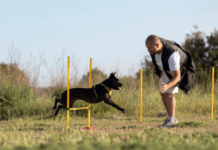Last Updated on September 28, 2023 by Dogs Vets
How to Introduce a New Dog to Your Home
Bringing a new dog into your home is an exciting but delicate process. Whether you’re a first-time dog owner or adding to your furry family, it’s essential to ensure a smooth transition for both your new canine companion and your household.
In this guide, we’ll walk you through the steps of introducing a new dog to your home successfully.
Understanding Your New Furry Friend
Before the big day arrives, it’s crucial to research and understand your new dog’s breed and personality. Different breeds have unique traits and energy levels, so knowing what to expect can help you prepare adequately.
Preparing Your Home
Create a safe and welcoming environment for your new dog. Remove any hazards or items that could be harmful, and designate a specific area for them to eat, sleep, and play.
The First Meeting
When you finally meet your new dog, take it slow. Allow them to explore their new surroundings and gradually introduce them to family members and other pets.
Establishing a Routine
Dogs thrive on routine, so establish a consistent schedule for feeding, walks, and playtime. This helps them feel secure in their new home.
Training and Socialization
Invest time in training your new dog and exposing them to different people, animals, and environments. This will help them become well-adjusted and well-behaved.
Addressing Challenges
Every dog is unique, and you may encounter challenges along the way. Whether it’s housebreaking or behavior issues, patience and positive reinforcement are key.
Conclusion
Bringing a new dog into your home is a rewarding journey. By following these steps and giving your new furry friend time to adjust, you’ll create a loving and harmonious environment for everyone.
FAQs
Q1: How long does it take for a new dog to adjust to its new home? A1: The adjustment period varies, but it can take a few weeks to a few months for a dog to fully settle in.
Q2: Should I adopt a puppy or an adult dog? A2: It depends on your lifestyle and preferences. Puppies require more training, while adult dogs may already have established behaviors.
Q3: What’s the best way to introduce a new dog to existing pets? A3: Gradual introductions in a neutral space, positive reinforcement, and supervision are key to a successful introduction.
Q4: How can I prevent separation anxiety in my new dog? A4: Gradually increase the time you spend away from your dog, provide toys and distractions, and consider crate training.
Q5: Are there any specific supplies I should have before bringing a new dog home? A5: You’ll need food and water bowls, a leash and collar, a comfortable bed, grooming supplies, and appropriate toys.
Q6: Can I introduce my new dog to other dogs at a dog park right away? A6: It’s best to wait until your dog is well-trained and socialized before introducing them to other dogs in a public setting.
Q7: What signs indicate that my new dog is settling in well? A7: Signs of a well-adjusted dog include a relaxed body posture, good appetite, and a wagging tail.
Source References and Links:























